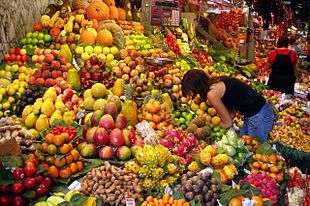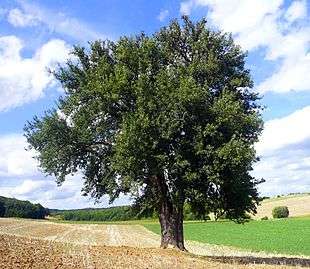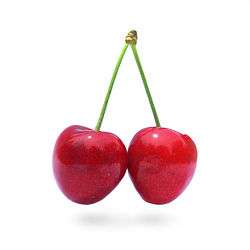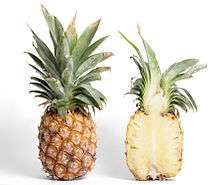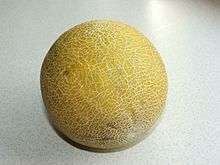Definify.com
Webster 1913 Edition
Fruit
Fruit
,Noun.
1.
Whatever is produced for the nourishment or enjoyment of man or animals by the processes of vegetable growth, as corn, grass, cotton, flax, etc.; – commonly used in the plural.
Six years thou shalt sow thy land, and shalt gather in the
fruits
thereof. Ex. xxiii. 10.
2.
(Hort.)
The pulpy, edible seed vessels of certain plants, especially those grown on branches above ground, as apples, oranges, grapes, melons, berries, etc. See 3.
3.
(Bot.)
The ripened ovary of a flowering plant, with its contents and whatever parts are consolidated with it.
☞ Fruits are classified as fleshy, drupaceous, and dry.
Fleshy fruits
include berries, gourds, and melons, orangelike fruits and pomes; drupaceous fruits
are stony within and fleshy without, as peaches, plums, and cherries; and dry fruits
are further divided into achenes
, follicles
, legumes
, capsules
, nuts
, and several other kinds. 4.
(Bot.)
The spore cases or conceptacles of flowerless plants, as of ferns, mosses, algae, etc., with the spores contained in them.
6.
The produce of animals; offspring; young;
as, the
. fruit
of the womb, of the loins, of the bodyKing Edward’s
fruit
, true heir to the English crown. Shakespeare
6.
That which is produced; the effect or consequence of any action; advantageous or desirable product or result; disadvantageous or evil consequence or effect;
as, the
. fruits
of labor, of self-denial, of intemperanceThe
fruit
of rashness. Shakespeare
What I obtained was the
fruit
of no bargain. Burke.
They shall eat the
fruit
of their doings. Is. iii 10.
The
fruits
of this education became visible. Macaulay.
☞ Fruit is frequently used adjectively, signifying of, for, or pertaining to a fruit or fruits; as, fruit bud; fruit frame; fruit jar; fruit knife; fruit loft; fruit show; fruit stall; fruit tree; etc.
Fruit bat
(Zool.)
, one of the Frugivora; – called also
– fruit-eating bat
. Fruit bud
(Bot.)
, a bud that produces fruit; – in most oplants the same as the power bud.
Fruit dot
(Bot.)
, a collection of fruit cases, as in ferns.
See Sorus
. – Fruit fly
(Zool.)
, a small dipterous insect of the genus
– Drosophila
, which lives in fruit, in the larval state. There are seveal species, some of which are very damaging to fruit crops. One species, Drosophila melanogaster
, has been intensively studied as a model species for genetic reserach. Fruit jar
, a jar for holding preserved fruit, usually made of glass or earthenware.
– Fruit pigeon
(Zool.)
, one of numerous species of pigeons of the family
– Carpophagidæ
, inhabiting India, Australia, and the Pacific Islands. They feed largely upon fruit. and are noted for their beautiful colors. Fruit sugar
(Chem.)
, a kind of sugar occurring, naturally formed, in many ripe fruits, and in honey; levulose. The name is also, though rarely, applied to
– invert sugar
, or to the natural mixture or dextrose and levulose resembling it, and found in fruits and honey. Fruit tree
(Hort.)
, a tree cultivated for its edible fruit.
– Fruit worm
(Zool.)
, one of numerous species of insect larvæ: which live in the interior of fruit. They are mostly small species of Lepidoptera and Diptera.
– Small fruits
(Hort.)
, currants, raspberries, strawberries, etc.
Fruit
,Verb.
I.
To bear fruit.
Chesterfield.
Webster 1828 Edition
Fruit
FRUIT
,Noun.
1.
In a general sense, whatever the earth produces for the nourishment of animals, or for clothing or profit. Among the fruits of the earth are included not only corn of all kinds, but grass, cotton, flax, grapes and all cultivated plants. In this comprehensive sense, the word is generally used in the plural.2.
In a more limited sense, the produce of a tree or other plant; the last production for the propagation or multiplication of its kind; the seed of plants, or the part that contains the seeds; as wheat, rye, oats, apples, quinces, pears, cherries, acorns, melons, &c.3.
In botany, the seed of a plant, or the seed with the pericarp.4.
Production; that which is produced.The fruit of the spirit is in all goodness, and righteousness, and truth. Eph. 5.
5.
The produce of animals; offspring; young; as the fruit of the womb, of the loins, of the body.6.
Effect or consequence.They shall eat the fruit of their doings. Is. 3.
7.
Advantage; profit; good derived.What fruit had ye then in those things whereof ye are now ashamed? Rom 6.
8.
Production, effect or consequence; in an ill sense; as the fruits of sin; the fruits of intemperance.FRUIT
,Verb.
I.
Definition 2026
fruit
fruit
English
Noun
fruit (countable and uncountable, plural fruits) (see Usage notes for discussion of plural)
- (botany) The seed-bearing part of a plant, often edible, colourful/colorful and fragrant, produced from a floral ovary after fertilization.
- While cucumber is technically a fruit, one would not usually use it to make jam.
- Any sweet, edible part of a plant that resembles seed-bearing fruit, even if it does not develop from a floral ovary; also used in a technically imprecise sense for some sweet or sweetish vegetables, such as rhubarb, that resemble a true fruit or are used in cookery as if they were a fruit.
- Fruit salad is a simple way of making fruits into a dessert.
- An end result, effect, or consequence; advantageous or disadvantageous result.
- His long nights in the office eventually bore fruit when his business boomed and he was given a raise.
- Shakespeare
- the fruit of rashness
- Bible, Isaiah iii. 10
- They shall eat the fruit of their doings.
- Macaulay
- The fruits of this education became visible.
- Offspring from a sexual union.
- The litter was the fruit of the union between our whippet and their terrier.
- Shakespeare
- King Edward's fruit, true heir to the English crown
- (colloquial, derogatory) A homosexual or effeminate man.
Usage notes
- In the botanical and figurative senses, fruit is usually treated as uncountable:
- a bowl of fruit; eat plenty of fruit; the tree provides fruit.
- fruits is also sometimes used as the plural in the botanical sense:
- berries, achenes, and nuts are all fruits; the fruits of this plant split into two parts.
- When fruit is treated as uncountable in the botanical sense, a piece of fruit is often used as a singulative.
- In senses other than the botanical or figurative ones derived from the botanical sense, the plural is fruits.
- The culinary sense often does not cover true fruits that are savoury or used chiefly in savoury foods, such as tomatoes and peas. These are normally described simply as vegetables.
Derived terms
Terms derived from fruit
Related terms
Translations
part of plant
|
|
food
|
|
figuratively: positive end result or reward of labour or effort
|
|
figuratively: child of a marriage
offensive slang: homosexual or effeminate man
|
Verb
fruit (third-person singular simple present fruits, present participle fruiting, simple past and past participle fruited)
- To produce fruit, seeds, or spores.
- 1910, Canada Experimental Farms Service, Report of the Dominion Experimental Farms:
- It may be said, however, that the percentage of green apples among the Fameuse seedlings is much less than among the others as out of 33 Fameuse seedlings which had fruited up to this year, none was green and we recollect but one light coloured Fameuse seedling fruiting this year.
- 1998, Randy Molina & David Pilz, Managing Forest Ecosystems to Conserve Fungus Diversity and Sustain Wild Mushroom Harvests, ISBN 0788143433, page 10:
- For example, chanterelles and russulas can start fruiting in early to mid summer given sufficient moisture, but other species, such as matsutake, rarely fruit until temperatures cool in the autumn, even if moisture is available earlier.
- 2014, David Mitchell, The Bone Clocks, ISBN 9780340921609, page 12:
- The grass and weeds come up to my waist and the plum trees are already fruiting up, though most of the fruit'll go to the wasps and the worms, Vinny says, 'cause he can't be arsed to pick it.
-
Translations
to produce fruit
See also
- Category:Fruits for a list of fruits
Dutch
Pronunciation
- Rhymes: -œy̯t
- IPA(key): /frœy̯t/
Etymology
From Middle Dutch fruut, froyt, from Old French fruit.
Noun
fruit n (uncountable)
- fruit (produced by trees or bushes, or any sweet vegetable)
Synonyms
Derived terms
French
Etymology
From Middle French fruict, alteration of Old French fruit, from Latin fructus (“enjoyment, proceeds, profits, produce, income”), a derivative of fruor (“have the benefit of, to use, to enjoy”), from Proto-Indo-European *bhrug- (“to make use of, to have enjoyment of”).
Pronunciation
- IPA(key): /fʁɥi/
- Homophone: fruits
Noun
fruit m (plural fruits)
Derived terms
Old French
Etymology
Pronunciation
- IPA(key): /frɥit/
Noun
fruit m (oblique plural fruiz or fruitz, nominative singular fruiz or fruitz, nominative plural fruit)
- fruit
- circa 1170, Christian of Troyes, Érec et Énide
- Oisiaus et veneison et fruit
- bird, venison and fruits
- Oisiaus et veneison et fruit
- circa 1170, Christian of Troyes, Érec et Énide
